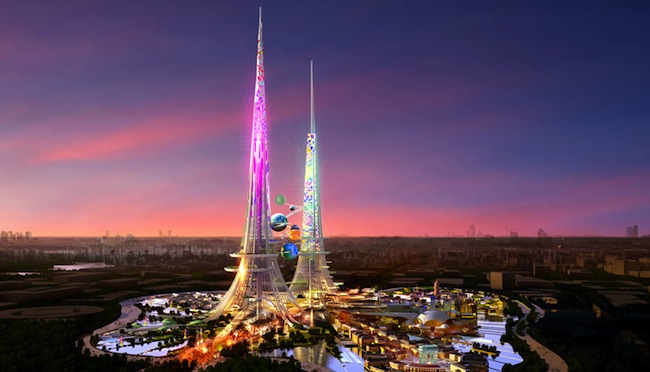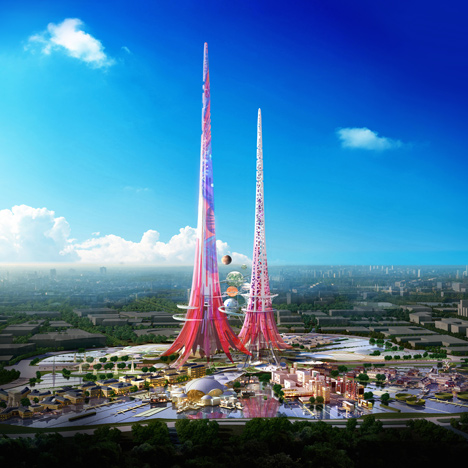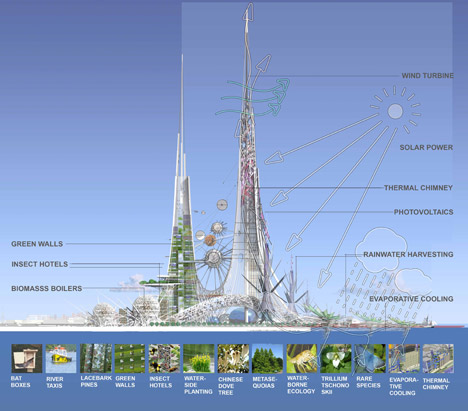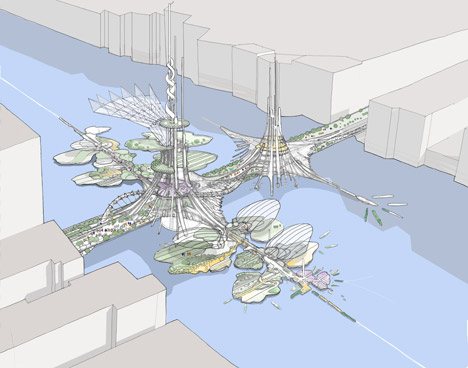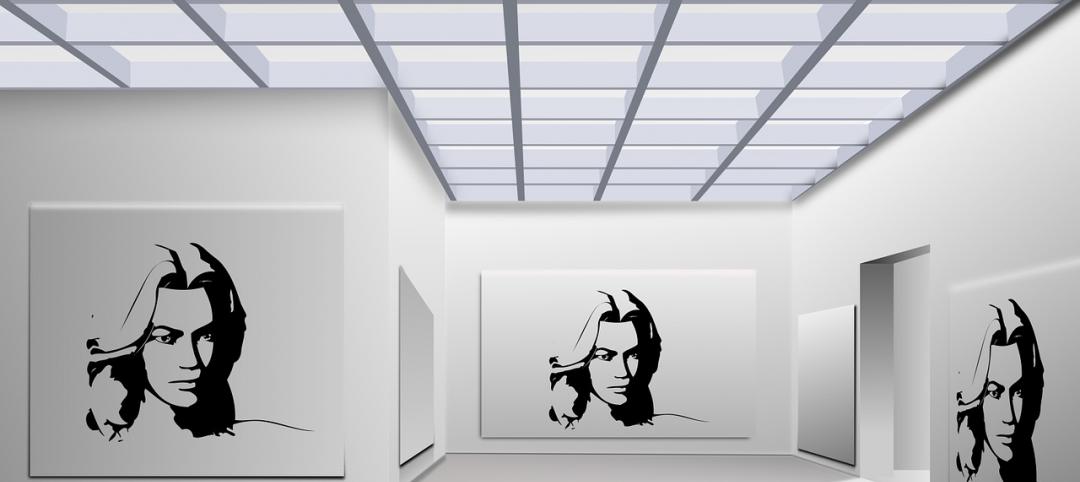U.K.-based Chetwoods Architects has revealed plans for a pair of skyscrapers that will be the tallest in the world when completed. The Phoenix Towers are expected to reach 1 km, the same height as Adrian Smith and Gordon Gill's Kingdom Tower, but would set a record for multiple towers in a single development, inhabitat reports.
The towers will be built on a 47-hectare island within a lake in Wuhan, China, the most populous city in central China. They are the focal point of Chetwood's four-pronged master plan for projects in China.
Outfitted with wind turbines, solar panels, thermal chimneys, and rainwater harvesting systems, the architects said that the towers will act as an "environmental catalyst" for the rest of the city.
On the towers' name and inspiration, the firm cites the traditional Chinese phoenix, which involves two birds: the male Feng and the female Huang.
"The plan was generated from yin-yang form to represent perfectly balanced union. Symbiotic: the Feng tower uses cutting edge technology to feed the Huang tower with renewable power," Chetwood Architects said in a statement.
More from the architects:
Arching bridge-like over the surrounding boulevards, each tower will have a unique personality and attributes: the Feng tower will lean towards the commercial zone, the Huang tower towards the cultural and recreational zone.
The project’s key emphasis is on the harmonious combination of 21st century Western technological know-how and experience with Chinese tradition and culture. In response to the Client’s wish to develop a new style of architecture that emphasizes Chinese identity, the use of a pair of towers reflects the dualist elements of Chinese culture in contrast to a more Western monolithic form.
The scheme will provide the environmental catalyst to re-invigorate the city, actively avoiding the disastrous consequences of developments elsewhere in China. It will form the nucleus of a wider green strategy linking Wuhan’s lakes environmentally and socially with the region’s landmark destinations and lake district along a 20km Green Wall of China to a new lakeside cultural tourist destination.
This landmark project will showcase social, economic and environmental sustainability within China, providing an entertaining and instructive experience for local people and visitors.
Structural features: Steel superstructure; concrete core with ‘hat’ truss; trussed structure at base; out-riggered for lateral stability; concrete buttresses.
Related Stories
Museums | Aug 11, 2010
Design guidelines for museums, archives, and art storage facilities
This column diagnoses the three most common moisture challenges with museums, archives, and art storage facilities and provides design guidance on how to avoid them.
| Aug 11, 2010
Broadway-style theater headed to Kentucky
One of Kentucky's largest performing arts venues should open in 2011—that's when construction is expected to wrap up on Eastern Kentucky University's Business & Technology Center for Performing Arts. The 93,000-sf Broadway-caliber theater will seat 2,000 audience members and have a 60×24-foot stage proscenium and a fly loft.
| Aug 11, 2010
Citizenship building in Texas targets LEED Silver
The Department of Homeland Security's new U.S. Citizenship and Immigration Services facility in Irving, Texas, was designed by 4240 Architecture and developed by JDL Castle Corporation. The focal point of the two-story, 56,000-sf building is the double-height, glass-walled Ceremony Room where new citizens take the oath.
| Aug 11, 2010
Carpenters' union helping build its own headquarters
The New England Regional Council of Carpenters headquarters in Dorchester, Mass., is taking shape within a 1940s industrial building. The Building Team of ADD Inc., RDK Engineers, Suffolk Construction, and the carpenters' Joint Apprenticeship Training Committee, is giving the old facility a modern makeover by converting the existing two-story structure into a three-story, 75,000-sf, LEED-certif...
| Aug 11, 2010
Utah research facility reflects Native American architecture
A $130 million research facility is being built at University of Utah's Salt Lake City campus. The James L. Sorenson Molecular Biotechnology Building—a USTAR Innovation Center—is being designed by the Atlanta office of Lord Aeck & Sargent, in association with Salt-Lake City-based Architectural Nexus.
| Aug 11, 2010
San Bernardino health center doubles in size
Temecula, Calif.-based EDGE was awarded the contract for California State University San Bernardino's health center renovation and expansion. The two-phase, $4 million project was designed by RSK Associates, San Francisco, and includes an 11,000-sf, tilt-up concrete expansion—which doubles the size of the facility—and site and infrastructure work.
| Aug 11, 2010
Goettsch Partners wins design competition for Soochow Securities HQ in China
Chicago-based Goettsch Partners has been selected to design the Soochow Securities Headquarters, the new office and stock exchange building for Soochow Securities Co. Ltd. The 21-story, 441,300-sf project includes 344,400 sf of office space, an 86,100-sf stock exchange, classrooms, and underground parking.
| Aug 11, 2010
New hospital expands Idaho healthcare options
Ascension Group Architects, Arlington, Texas, is designing a $150 million replacement hospital for Portneuf Medical Center in Pocatello, Idaho. An existing facility will be renovated as part of the project. The new six-story, 320-000-sf complex will house 187 beds, along with an intensive care unit, a cardiovascular care unit, pediatrics, psychiatry, surgical suites, rehabilitation clinic, and ...
| Aug 11, 2010
Colonnade fixes setback problem in Brooklyn condo project
The New York firm Scarano Architects was brought in by the developers of Olive Park condominiums in the Williamsburg section of Brooklyn to bring the facility up to code after frame out was completed. The architects designed colonnades along the building's perimeter to create the 15-foot setback required by the New York City Planning Commission.


